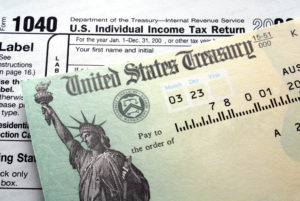
During this lengthy period of isolation and social distancing, many are struggling financially who will benefit from the government’s most recent stimulus package arising from COVID-19, designated “Economic Impact Payments.” Here are some of the most frequently asked questions and answers to address questions about the stimulus payments:
- Am I eligible for a stimulus payment? In general, most U.S. residents, whether employed, unemployed, or retired, will receive a stimulus payment. Students, children, and others who were claimed as a “dependent” of another taxpayer are not eligible. Also ineligible are those who, in 2018 or 2019, reached certain gross income thresholds: $99,000 for those who file “single” or “married filing separately,” $136,500 for those who file “head of household,” and $198,000 for those who file “married filing jointly.” In addition, anyone who is a nonresident alien, does not have a valid Social Security number, or filed a Form 1040-NR, Form 1040NR-EZ, Form 1040-PR, or Form 1040-SS for 2019 is ineligible.
- How much money will I receive? Individuals who are eligible for a stimulus payment will receive $1,200 ($2,400 for married couples), with an additional $500 for each qualifying child. Once a person’s gross income for 2018 or 2019 exceeds $75,000 for those who filed “single” or “married filing separately,” $112,500 for those who filed “head of household,” or “$150,000 for those who filed “married filing jointly,” the amount of the payment will be reduced.
- Do I need to do anything to receive the payment? Generally no. Those with direct deposit information on file with the IRS need to do nothing – eligible payments will be directly deposited over the coming weeks. The IRS has direct deposit information on file if you filed your 2018 or 2019 tax return listing bank information for either payment or refund, and those who already receive Social Security, disability, or Railroad Retirement benefits. Others who do not have bank account information on file with the IRS, such as those who did not file a 2018 or 2019 federal income tax return, can enter their payment and dependent information online (https://www.irs.gov/coronavirus/economic-impact-payments). This website can also be used to provide the IRS with a new mailing address if you moved or check on the status of your stimulus payment if you have not received it. However, it cannot be used to change direct deposit information already on file with the IRS.
- Note: Scam artists are already developing new scams to steal personal information and money. Do not provide your personal information or bank account information to anyone over the phone, through email, or text. The only way to provide your bank account information to the IRS to receive the economic impact payment is through the link above or by filing your 2018 or 2019 federal income tax returns.
- When will I receive the payment? The IRS is beginning to make direct deposits of stimulus payments soon. It appears that the IRS will begin making payments first to those qualifying persons who already filed their 2019 federal income tax returns, then those who filed 2018 federal income tax returns, and then to those receiving Social Security benefits. For those who did not file federal income tax returns for 2018 or 2019, and for whose direct deposit information is not on file, the IRS will begin mailing out checks in early May 2020, although the process could take some time. In addition, the IRS will send a confirmation letter about each economic impact payment to the taxpayer’s last address within 15 days after the payment is made. If you receive a letter but did not yet receive the stimulus payment, please click the link above to check on the status of your stimulus payment.
- Will I receive a payment if I owe the IRS past-due taxes? The stimulus payment cannot be intercepted for past-due taxes, student loans, or unemployment insurance overpayments. However, it can be intercepted for overdue child support obligations, depending on each state’s policies. Nevertheless, those with past-due tax liabilities should find an acceptable resolution. Our firm assists taxpayers with federal or state tax liabilities reach a resolution with the IRS or other state or local authority, and we are available now to discuss your case.
- What if the IRS has my Tax Return Preparer’s direct deposit information instead of mine? For those who filed tax returns for 2018 or 2019 using a refund advance, where your tax preparer provides you with a check or prepaid debit card upon the filing of your tax return, the IRS’s records likely do not contain the correct direct deposit information. For those in this situation, the IRS may attempt to direct deposit stimulus payments to the preparer’s bank account. If the account was temporary and has since been closed, the IRS will likely need to send the taxpayer a paper check to their last known address. If the tax preparer’s account is still open, the taxpayer may need to communicate with their preparer to receive the stimulus payment. Taxpayers may use the link posted above to check on the status of their stimulus payment. If possible, taxpayers can e-file their 2019 federal income tax return and provide their own bank account information using free software provided through the IRS’s website here: https://www.irs.gov/filing/free-file-do-your-federal-taxes-for-free.
Gensburg Calandriello & Kanter, P.C. is monitoring on a daily basis the situation and programs, and is well-equipped to assist you in managing your legal needs during this difficult period. Please contact us if we can be of assistance.
Sandra Mertens
[email protected]

